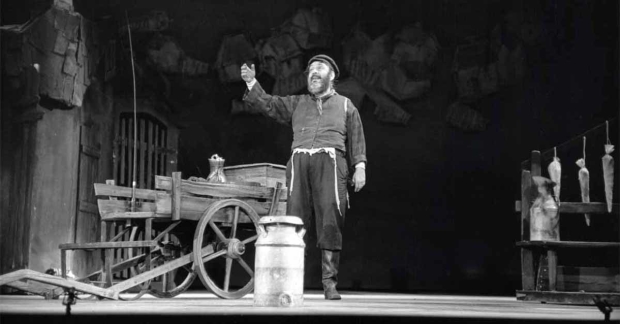A Fiddler on the Roof Documentary. Sound Crazy? It Isn't.
This new film looks at the cultural history of one of the world’s most beloved musicals.

(photo provided by Roadside Attractions and Samuel Goldwyn Films)
There's no classic musical riper for a "making of" film than Fiddler on the Roof. The nine-time Tony-winning musical tells the story of Jewish peasants expelled from their home, and since its premiere in 1964, it has managed to transcend religious and domestic lines to become one of the most internationally beloved shows of all time.
Director Max Lewkowicz seizes on this idea in his new documentary Fiddler: A Miracle of Miracles, to be released in cinemas Friday, August 23. The film presents a deep dive into the cultural history of the show, which will no doubt thrill theater aficionados. There's production footage from Broadway and world productions, demos performed by songwriters Jerry Bock and Sheldon Harnick, and interviews with everyone from Chaim Topol (the Tevye of the 1971 film adaptation) to Lin-Manuel Miranda. But for all the excellent interviews and great footage, part of its focus, at least in the Fiddler on the Roof in Yiddish era, seems curiously out of date.
And that's particularly disappointing, because, as the movie's central thesis proves, the themes of Fiddler on the Roof will never be out of date. Adapted from Sholem Aleichem's Tevye the Dairyman short stories, the show has earned worldwide appeal because of its universality.
The authors were building their story about the death of tradition at a time when traditions were evolving or eroding in the United States. The various American struggles of race relations, gender roles, and bourgeoning sexuality at that time can be seen in the storylines of the individual characters. It's a highly relatable story no matter what stage of life you're in, as a past Tevye, Harvey Fierstein, points out in an interview. This timeless theme is why diverse audiences relate to it. As the documentary shows, whether it's presented as a traditional Fiddler on Broadway with professional actors, or in Brownsville, Brooklyn with a cast of African-American elementary school students, or in Thailand with an all-Thai company, the performers and audience find a way into the material.
Lewkowicz does an excellent job of depicting this through new and existing interviews with people connected to the show. Bock and book writer Joseph Stein, who died in 2010, are both represented, as is Harnick, who, at 95, is the only surviving member of the original creative team. The film would be enough if it was just this, or a clip of Zero Mostel (the first Tevye) singing "If I Were a Rich Man" with Dick Cavett, or a video of Miranda hearing stories about a Japanese production of Fiddler in Stein's apartment. Michael Bernardi, son of longtime Tevye Herschel, becomes the emotional center of the piece as he describes playing the role himself on Broadway (which he did in 2016), wearing his dad's old costume boots.
Still, when creating a definitive cultural history of Fiddler on the Roof for release in 2019, the absence of Gwen Stefani's song "Rich Girl" from a montage of "If I Were a Rich Man" covers seems like a glaring oversight. Worse is how Joel Grey's Yiddish Fiddler, which is still running in New York City and is one of the most acclaimed productions of the musical to date, feels like an afterthought. By shortchanging it, this look at the worldwide importance of Fiddler on the Roof seems a little like the fiddler himself: precariously balanced, hoping nothing will throw him off.
Editor's Note: Following the publication of this review, director Max Lewkowitz got in touch with us. He explained that issues regarding usage rights prevented Fiddler on the Roof in Yiddish from having a larger presence in the film, and prevented Gwen Stefani's "Rich Girl" from appearing at all.







